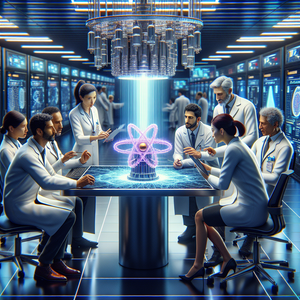The Future of Energy: How Nano-Nuclear Energy is Changing the Game

Nano-Nuclear Energy harnesses the principles of nuclear physics on a nanoscale, offering a transformative approach to energy production. Unlike traditional nuclear energy, which relies on large-scale reactors, nano-nuclear technology utilizes small, modular reactors (SMRs) that can be deployed in diverse settings, from urban centers to remote locations. This scalability not only enhances energy accessibility but also mitigates the risks associated with larger nuclear facilities.
Environmental Impact and Waste Management
One of the most significant advantages of nano-nuclear technology is its ability to produce energy with minimal environmental impact. The small reactors generate substantially less waste compared to conventional nuclear plants, and their design allows for safer containment of radioactive materials. As the world shifts towards a low-carbon future, such innovations are crucial in reducing greenhouse gas emissions while meeting burgeoning energy needs.
Emerging Technologies and Innovations
Nano-Nuclear Energy stands at the forefront of various technological advancements. One promising innovation is the development of advanced materials that can withstand high radiation levels while maintaining efficiency. These materials, often engineered at the nanoscale, enhance the longevity and safety of reactors, making them more appealing for widespread adoption.
Digital Technology and AI Integration
The integration of digital technology and artificial intelligence (AI) into reactor monitoring systems is revolutionizing operations. Real-time data analytics enable predictive maintenance, ensuring that potential issues are identified and addressed before they escalate. This not only improves safety but also optimizes energy production, allowing for a more reliable and responsive energy supply.
Addressing Industry Trends and Global Challenges
As global energy demands rise, the urgency for alternative energy solutions intensifies. According to the International Energy Agency (IEA), global electricity demand is set to increase by 30% by 2040. In this context, Nano-Nuclear Energy's innovative approach aligns with the trends of decentralization and digitization in energy production. By decentralizing energy sources, communities can achieve greater energy independence and resilience against supply disruptions.
Climate Change and Sustainability Goals
Moreover, the company is addressing the pressing issue of climate change head-on. The United Nations' Climate Change Conference (COP26) highlighted the crucial need for all sectors to contribute to net-zero emissions by 2050. Nano-Nuclear Energy's commitment to developing clean, low-carbon energy solutions positions it as a key player in meeting these ambitious targets. The company's technologies can complement renewable energy sources, providing a stable and reliable backup during periods of low renewable output.
Collaborative Efforts for a Sustainable Future
Collaboration is vital in the energy sector, and Nano-Nuclear Energy actively engages with governments, research institutions, and industry partners to drive innovation. By participating in public-private partnerships, the company fosters an environment where new ideas can flourish and be translated into practical solutions. This collaborative approach not only accelerates technology development but also helps shape policies that support the adoption of sustainable energy practices.
Career Paths at Nano-Nuclear Energy
Nano-Nuclear Energy offers a range of career opportunities across various fields, including engineering, research and development, regulatory affairs, and project management. Potential career paths include Nuclear Engineers, Materials Scientists, Data Analysts, and Regulatory Affairs Specialists.
Office Locations
Nano-Nuclear Energy operates several offices across key geographical locations, including Headquarters, Research and Development Centers, and Regional Offices.
Products and Services Offered by Nano-Nuclear Energy
Nano-Nuclear Energy specializes in several products and services designed to meet the growing demand for sustainable energy, including Small Modular Reactors (SMRs), Advanced Nuclear Fuel, and Consulting Services.
The future of energy is not just about finding alternatives; it's about reshaping the very foundation of how we produce and consume energy. Nano-Nuclear Energy stands as a beacon of innovation, offering scalable, sustainable, and safe energy solutions that address the pressing challenges of our time. As we move towards a cleaner, more sustainable world, the role of nano-nuclear technology will undoubtedly become more prominent, helping to bridge the gap between energy demands and environmental stewardship. By embracing these advancements and fostering collaboration across sectors, we can pave the way for a brighter, more sustainable future for generations to come.
Nuclear Systems Engineer
Westinghouse, GE Hitachi Nuclear Energy
Core Responsibilities
Design and optimize Small Modular Reactors (SMRs) to ensure safety, efficiency, and regulatory compliance.
Conduct simulations and modeling to predict reactor performance under various operational scenarios.
Collaborate with cross-functional teams to integrate advanced materials and technologies into reactor designs.
Required Skills
Proficiency in nuclear engineering principles and reactor dynamics.
Experience with simulation software (e.g., ANSYS, FLUENT) and CAD tools.
Strong analytical and problem-solving abilities.
Radiation Safety Specialist
Regulatory agencies, nuclear power plants
Core Responsibilities
Monitor and assess radiation levels to ensure compliance with safety regulations in the operation of nano-nuclear facilities.
Develop and implement radiation safety protocols and training programs for staff.
Conduct investigations and reporting on radiation incidents or near misses to improve safety measures.
Required Skills
In-depth knowledge of radiation protection principles and regulations (e.g., NRC guidelines).
Certification in radiation safety (e.g., Certified Health Physicist).
Excellent communication skills to effectively train and inform staff.
Advanced Materials Engineer
Material science companies, nuclear energy firms
Core Responsibilities
Research and develop advanced materials capable of withstanding high radiation and temperature in SMRs.
Analyze the performance of materials under operational conditions to ensure longevity and reliability.
Collaborate with nuclear engineers and manufacturing teams to integrate materials into reactor designs.
Required Skills
Strong background in materials science, particularly in nanotechnology and composites.
Familiarity with material testing techniques and standards.
Experience in data analysis and interpretation of material performance results.
AI Data Analyst for Energy Systems
Energy tech companies, consulting firms
Core Responsibilities
Utilize machine learning algorithms to analyze operational data from nano-nuclear reactors for predictive maintenance.
Develop real-time analytics dashboards to monitor reactor performance and optimize energy output.
Collaborate with engineering teams to translate data insights into operational improvements.
Required Skills
Proficiency in programming languages such as Python, R, or MATLAB.
Experience with data visualization tools (e.g., Tableau, Power BI).
Background in energy systems or nuclear engineering preferred.
Regulatory Affairs Manager
Nuclear energy companies, governmental regulatory bodies
Core Responsibilities
Navigate complex regulatory frameworks to ensure compliance with nuclear energy standards and policies.
Prepare and submit documentation for regulatory approvals related to SMR deployment.
Liaise with government agencies and stakeholders to advocate for policies supporting nano-nuclear energy.
Required Skills
Comprehensive knowledge of nuclear regulations and standards (e.g., NRC, DOE).
Strong project management and organizational skills.
Excellent verbal and written communication abilities to articulate complex regulatory issues.


